Welcome.
‘Now I am become Death‘ is a new essay series exploring death and resurrection in A Song of Ice and Fire. We’ll be analyzing how they function as mechanics, understanding how they function thematically, and predicting how they’ll function moving forward into the endgame.
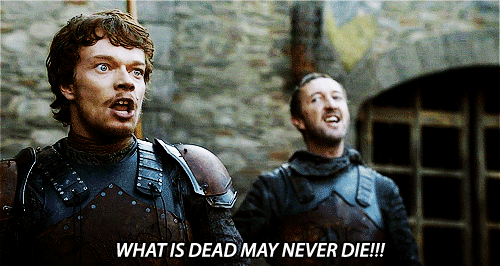
Some of the ideas that I’ll be getting into here will be unpopular, might be a little unconventional, and may challenge some more well accepted theories. Hell, some of this will even tweak my own Weirwood Leviathan theory (parts VII and VIII). So I hope that you’ll remember that this is fiction, and in the end none of us (unless 1 of like 3 specific people is reading this) really know what is going to happen. I bring this up because I myself am often guilty of shutting out theories before really consider them, yet it’s possible to discuss and even entertain conflicting ideas.
What is Dead and What Rises Again?
It’s gonna burn for me to say this, But it’s coming from the heart. It’s been a long time coming, but Jon Snow is dead, and I’m not so sure he is really coming back.
With Season 6 on the way, everyone’s mind is on how we can get Jon Snow back to live out all of our favorite fan theory moments, and everyone is talking about resurrection. The five years of speculation since the release of ADWD has led the fanbase to a pretty solid conclusion that after spending some time in Ghost, Jon will be resurrected by Melisandre (at least on the show), or perhaps Lady Stoneheart. Yet the details and mechanisms of Jon’s return are still debated, and often times it seems that theorists are blurring the line between what is being set up by the narrative, what GRRM has said on the matter, and simply wishful thinking.
But what if Jon Snow’s death is not simply a quick way to bypass the character development of the initially planned 5 year timeskit? What if it’s not just a cheat to weasel him out of the vows he made in the first book? What if it’s not the twist that everyone and their facebook feed sees coming… What if the death and return of Jon Snow is among the biggest twists of the series? One that has been set up from the very beginning, built into the very core thematic structure of the world and the story.
In this 3 part series, I’m going to present what I feel is a strong case for why it’s more complicated than a level up.
While reading this essay, I hope you’ll keep these questions in mind:
- How does GRRM prefer to utilize death and resurrection in his narrative?
- Why did Martin choose to kill Jon Snow?
- Who is the Beric Dondarrion that Arya meets in A Storm of Swords?
- How much of yourself (personality, memories, habits) can be lost before you are someone else?
- What is the difference between a Wolf and a Refrigerator?
“Deep down you know it’s best for yourself but you,
Hate the thought of her being with someone else
But you know that it’s over,
You know that it was through
Let it burn
Let it burn
Gotta let it burn”
Martin’s Guide To Killing Wizards
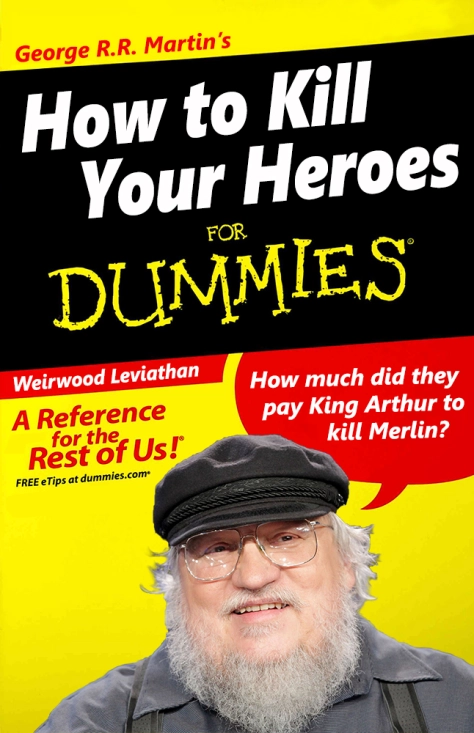
Now, let’s have a talk about death and resurrection. GRRM will go first.
I do think that if you’re bringing a character back, that a character has gone through death, that’s a transformative experience. Even back in those days of Wonder Man and all that, I loved the fact that he died, and although I liked the character in later years, I wasn’t so thrilled when he came back because that sort of undid the power of it. – GRRM
Whether we like it or not, Martin has been pretty clear that he prefers there be real character consequences when a character comes back from the dead. Ever the fan of comics, Martin understands the danger of destroying the suspension of disbelief around death. And like countless other things Martin has said repeatedly, but the fandom ignores, I suggest we start accepting that the forefront of Martin’s work is going to apply what he believes in.
Much as I admire Tolkien, I once again always felt like Gandalf should have stayed dead. That was such an incredible sequence in Fellowship of the Ring when he faces the Balrog on the Khazad-dûm and he falls into the gulf, and his last words are, “Fly, you fools.”
What power that had, how that grabbed me. And then he comes back as Gandalf the White, and if anything he’s sort of improved. I never liked Gandalf the White as much as Gandalf the Grey, and I never liked him coming back. I think it would have been an even stronger story if Tolkien had left him dead.” – GRRM
When Martin talks about the return of Gandalf the Grey as Gandalf the White, he is unambiguous about what it is specifically about resurrection he doesn’t approve of, and very clear about how he prefers to have it work.
Here is what Martin is NOT saying:
- That it bothered him because the mechanism for resurrection was not sufficiently established.
- That it bothered him because no other character, animal, or small child was sacrificed to bring Gandalf back.
- That it bothered him because fire was involved in his death, and fire has to deteriorate identity.
- That it bothered him because there was no loophole set up for a comparatively more perfect resurrection. For example, that he would have considered it better writing if Gandalf had hidden his mind inside Shadowfax.
- That it bothered him because Gandalf didn’t have a secret parentage he needed to discover, or because he thought Gandalf’s purpose was somehow complete.
Here is what Martin is saying:
- It bothered him because dying and coming back to life didn’t really have consequences to who Gandalf was. It mainly just made him more effective.
- It bothered him because Gandalf’s death made things more difficult and Gandalf’s return softened that challenge without sufficient negative consequence.
NOTE: Whether you agree with Martin’s philosophy on how death and resurrection in fiction, looking at Martin’s beliefs is likely the most effective way to understand what he is doing. Maybe you prefer the Tolkein style resurrection or the Dragon Ball Z laws of death, and that is fine. But we can’t really expect Martin’s work to play out contrary to his own beliefs.
My characters who come back from death are worse for wear. In some ways, they’re not even the same characters anymore. The body may be moving, but some aspect of the spirit is changed or transformed, and they’ve lost something. – GRRM
He isn’t just talking a big game. If we apply this to our story, Martin has pulled no punches in practicing what he is preaching.
Sending Snow Wight to Sleep
“Jon fell to his knees. He found the dagger’s hilt and wrenched it free. In the cold night air the wound was smoking. “Ghost,” he whispered. Pain washed over him. Stick them with the pointy end.
When the third dagger took him between the shoulder blades, he gave a grunt and fell face-first into the snow. He never felt the fourth knife. Only the cold…”– Jon XIII, ADWD
Bearing all that in mind, we have to ask ourselves.
Why did George kill Jon? Even a casual look at the story would indicate that Jon’s death wasn’t something GRRM came up with last minute to fast track Jon Snow’s character development. Rather, he seems to have had it planned very early on. Maybe not as early as the pitch letter, but seemingly as early as the first book.
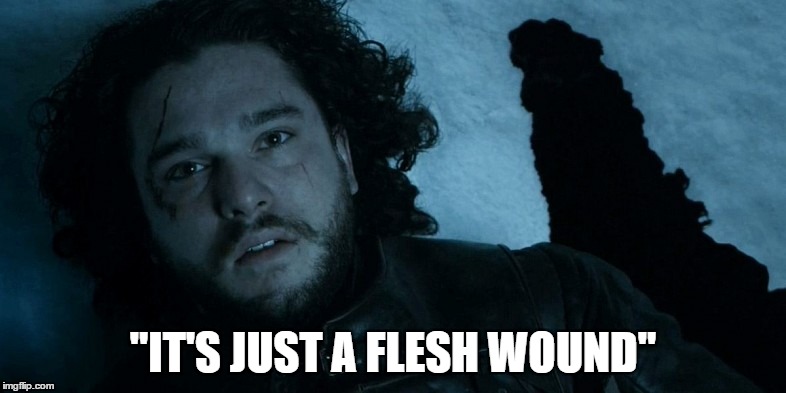
Here is Jon’s reoccurring crypt dream:
“No one. The castle is always empty.” He had never told anyone of the dream, and he did not understand why he was telling Sam now, yet somehow it felt good to talk of it. “Even the ravens are gone from the rookery, and the stables are full of bones. That always scares me. I start to run then, throwing open doors, climbing the tower three steps at a time, screaming for someone, for anyone. And then I find myself in front of the door to the crypts. It’s black inside, and I can see the steps spiraling down. Somehow I know I have to go down there, but I don’t want to. I’m afraid of what might be waiting for me. The old Kings of Winter are down there, sitting on their thrones with stone wolves at their feet and iron swords across their laps, but it’s not them I’m afraid of. I scream that I’m not a Stark, that this isn’t my place, but it’s no good, I have to go anyway, so I start down, feeling the walls as I descend, with no torch to light the way. It gets darker and darker, until I want to scream.” He stopped, frowning, embarrassed. “That’s when I always wake.” – Jon IV, AGOT
hmm.. what is it deep in the darkness that Jon is afraid of? We’ll get to that, but I really don’t think it’s a harp or his own trusty pet dragon…
and here is Bran’s Three Eyed Crow coma dream:
Finally he looked north. He saw the Wall shining like blue crystal, and his bastard brother Jon sleeping alone in a cold bed, his skin growing pale and hard as the memory of all warmth fled from him. – Bran III, AGOT
George could have come up with other ways to free Jon from his vows, or have him fulfill the wording of a prophecy, or he could have had Jon decide that the best way to stop the Others was to accept Stannis’ offer and take Winterfell. If GRRM believes that death should be a transformative process, then he must have killed Jon to transform him.
But everything is transformation. Losing home like Arya or losing loved ones like Cersei is transformative. For Tyrion, being betrayed was transformative. For Theon, torture and dismemberment was transformative. For Sam, falling in love was transformative. Jon Connington’s illness and Jaime’s injury were transformative. Aging transforms, motherhood, fatherhood, war, warging, and so much more transform. Why choose death specifically? What was the change Jon needed to undergo that he needed to die for?
For us to understand, let’s look at how Martin writes the dead.
Burning Man Returning Man
“I’ve tried to set it up beforehand with Beric Dondarrion and his repeated [resurrections]. There’s a brief appearance by Beric in Book One and he rides into the city and he’s this flamboyant Southern knight. That’s not that man we meet later on.” – GRRMS
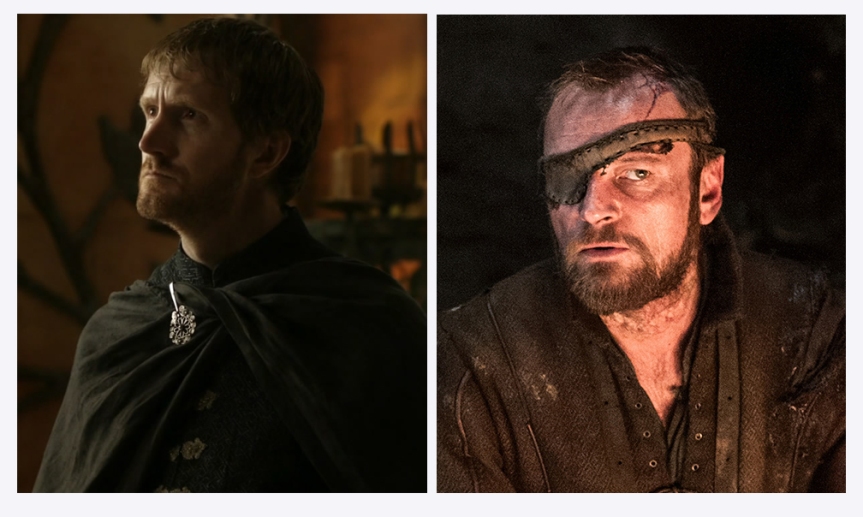
When we look at Beric Dondarrion, AKA the Lightning Lord, AKA the Lord of Corpses, AKA the Scarecrow Knight, and (presumably) our first character ‘resurrected in the light of the one true god,’ we get a very good sense for what has become of him. Five resurrections have turned what was once a “flamboyant southern knight” into something else entirely. He’s not really the same man. Beric Dondarrion is dead inside
But how far does this go? Clearly Beric is a changed man. But on a conceptual level, how much does a man need to change before he is not the same man?
“Can I dwell on what I scarce remember? I held a castle on the Marches once, and there was a woman I was pledged to marry, but I could not find that castle today, nor tell you the color of that woman’s hair. Who knighted me, old friend? What were my favorite foods? It all fades. Sometimes I think I was born on the bloody grass in that grove of ash, with the taste of fire in my mouth and a hole in my chest. Are you my mother, Thoros?” – Beric (Arya VII, ASOS )
Here we can see that Beric scarcely even remembers anything about who he was. His memories of being the man he once was are vague, and a lot of his idea of who he is has been told to him by others who remember. Now this is nothing new, and fans have rationalized this as being a result of six resurrections, so we assume this is nothing Jon really has to worry about. So Jon’s change will be watered down.
But for now, let’s just keep this in mind and ask ourselves: How much of ourselves are we without our memories? What ties a person together if not personality and memory?
He was sent on a mission to do something, and it’s like, that’s what he’s clinging to. He’s forgetting other things, he’s forgetting who he is, or where he lived. He’s forgotten the woman who he was once supposed to marry. Bits of his humanity are lost every time he comes back from death; he remembers that mission. His flesh is falling away from him, but this one thing, this purpose that he had is part of what’s animating him and bringing him back to death. I think you see echoes of that with some of the other characters who have come back from death. – GRRM
People say I was influenced by Robert Frost’s poem, and of course I was, I mean… Fire is love, fire is passion, fire is sexual ardor and all of these things. Ice is betrayal, ice is revenge, ice is… you know, that kind of cold inhumanity and all that stuff is being played out in the books. – GRRM
Again, what Martin tells us proves completely true. Beric has been resurrected by fire, and that resurrection has reduced him down to a single purpose. A singular desire that drives him. Which calls back to what Martin has said about “ice” and “fire.” Martin is referencing the Robert Frost poem ‘Fire and Ice’, which associates fire as desire, and ice as hate. Beric is resurrected through fire, and in a(n at least symbolic) sense, the fire Thoros is using to resurrect Beric comes from inside him. The fire of his own inner purpose. His mission. His desire.
But is that all that holds Beric’s identity together? Is a purpose a person? Is Azor Ahai a person?
“Lady Stoneheart is not Catelyn,”- GRRM
Which brings us to Lady Stoneheart. AKA Mother Merciless. AKA The Hangwoman. Or as Martin calls her; Not Catelyn. Though Beric is resurrected 6 times by Thoros, his 7th and final death occurs when he transfers his life over to Lady Catelyn, who spends 3 days dead in a river before being pulled from a river by Nymeria, kissed by Beric, and making a Christ-like return from the dead.
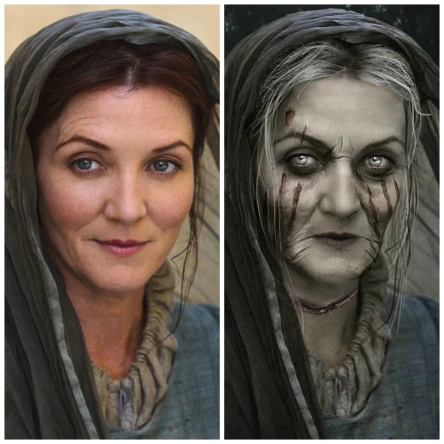
“The flesh had gone pudding soft in the water and turned the color of curdled milk. Half her hair was gone and the rest had turned as white and brittle as a crone’s. Beneath her ravaged scalp, her face was shredded skin and black blood where she had raked herself with her nails. But [Lady Stoneheart’s] eyes were the most terrible thing. Her eyes saw him, and they hated.” – Epilogue, ASOS
And already, after a single death Lady Stoneheart is seemingly less her original self than even Beric Dondarrion was his original self after 6. Lady Stoneheart looks practically corpse-like, and she cannot even speak without covering the wound in her mouth. And like the Lord of Corpses, Lady Stoneheart is driven by a singular purpose. Yet the fire association to the ‘Fire and Ice’ poem isn’t as clear cut here. Yes she is seemingly reborn by fire, and she is driven by a desire. But it’s a desire for vengeance, driven by hatred, which are by Robert Frost and Martin associated with Ice. A desire to take cold revenge on those who betrayed and killed her and her family at the Red Wedding. A hatred that extends to even Lannisters and Freys and Boltons who had nothing to do with the Red Wedding. So it seems that the fire and ice association with the Robert Frost poem isn’t so clear cut. The common denominator is purpose. Beric and Catelyn are resurrected and animated by the same power, and thus are driven for a singular purpose.
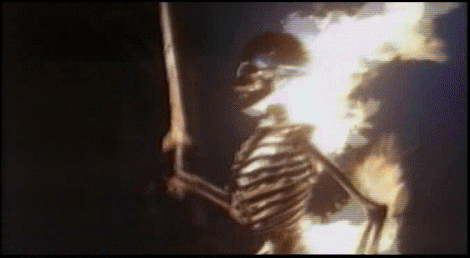
Another thing to take note about Lady Stoneheart which could be nothing, but could also be hugely significant, is that Catelyn’s POV chapters are discontinued when she dies. The Red Wedding serves as the end of Catelyn’s story, and Lady Stoneheart has no POVs. Which should make us seriously question whether a resurrected Jon would follow suit. We don’t know that Martin will do the same with Jon as he does with Cat, but we should be seriously considering it a lot more than we actually are as a fandom.
Now there is also this super out there theory that Robb accidentally attempted to skinchange Catelyn at the moment of death, and whether such an attempt was successful at all is doubtful, but we’ll come back to that…
That said, now that I’ve realized his three-fold revelation strategy, I see it in play almost every time. The first, subtle hint for the really astute readers, followed later by the more blatant hint for the less attentive, followed by just spelling it out for everyone else. It’s a brilliant strategy, and highly effective. – Ann Groel, GRRM’s editor
Yet, applying GRRM’s three-fold revelation strategy to the Scarecrow Knight, Lady Stoneheart, and next to Snow Wight, tends to quite often fall to the same oddly optimistic assumption. That of the three, Jon’s transformation will be inconsequential, or the least consequential of the three. Because Jon will be preserved inside Ghost.
But I’m not so sure. Maybe he will… But I can’t help but feel that the driving force behind this assumption is that the fandom is constructing their beliefs around wishful thinking. People want and thus expect, for Jon to come back new and improved, but really the same old Jon. Just more effective at his task, with a few little memory lapses. More or less to get the Gandalf the White treatment. But our author didn’t really like Gandalf the White.
The Difference between Wolves and Refrigerators
“Fire consumes, but cold preserves.” – Maester Aemon (Samwell III, AFFC)
The above quote from the feverish and dying maester Aemon is hugely significant. And it comes to us amidst a bunch of what is likely highly significant and seemingly under analyzed dialogue about dragon dreams killing you, half-remembered prophecy, Jon, The Prince That Was Promised, and wonders and terrors. Yet I find that this quote is pretty consistently interpreted half rationally and half through what I consider “optimism goggles.”
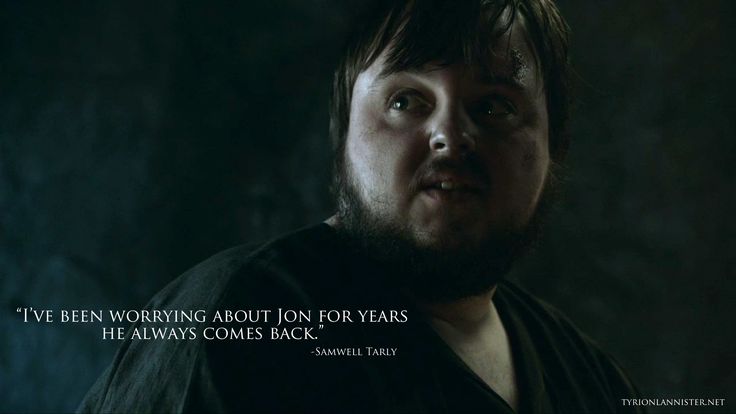
Now, the idea that this quote on fire consuming and cold preserving is intended to make us think about resurrection, is pretty likely, as it echoes an ominous thing Beric Dondarrion specifically said about resurrection.
“Fire consumes.” Lord Beric stood behind them, and there was something in his voice that silenced Thoros at once. “It consumes, and when it is done there is nothing left. Nothing.” – 6 time resurrected Beric Dondarrion (Arya VIII, ASOS)
Here Beric ‘Let it Burn‘ Dondarrion, tells us that fire (or, desire) consumes. And yes, he is specifically talking about resurrection. Right here GRRM sets us up to read Maester Aemon’s ‘Fire consumes’ as being a reference to resurrection. When Beric tells us that fire consumes, he is telling us that resurrection and purpose consume his identity. It consumes his memories and personality. The fire which keeps him alive has a price, and that price is the burning away of who he was.
So when we juxtapose fire against ice, we are being told by the dying maester that cold may not have the same consequence as fire, but rather that it preserves something Beric is losing. Subsequently, fans have largely come to the conclusion that “cold preserves “… means warging into a wolf preserves.
wait… what?
Where are we getting that exactly? Yes, since the coming of the Andals the magic of the Old Gods and skinchangers now mostly reside up north, but sometimes it seems that fan insistence on compartmentalizing every character or every type of magic into either a fire box or an ice box is a crutch which distracts us from what’s actually happening.

For example, the magic of the Others obviously revolves around ice, but there is no cold or ice association with greensight, warging, and the Children of the Forest. In fact, Bloodraven is half Targaryen, and Raventree Hall and the Isle of Faces are in the Riverlands. So, why is it that we’ve decided that “cold = warging”? and more importantly, where are we getting that warging preserves?
In fact, everything about the Varamyr chapter tells us that the second life inside of a wolf specifically doesn’t preserve. The warg gradually loses themselves to the wolf.
“They say you forget.” Haggon had told him, a few weeks before his own death. “When the man’s flesh dies, his spirit lives on inside the beast, but every day his memory fades, and the beast becomes a little less a warg, a little more a wolf, until nothing of the man is left and only the beast remains.” – (Prologue, AWDW)
In ASOS, Jojen warns Bran against spending too much time inside Summer. This conversation is so important it was put into the show in Season 4 episode 2, an episode written by GRRM.
Jojen: Summer was eating. You’re body can’t live on the food your wolf consumes. Spending too much time in Summer’s skin is dangerous. You’re not a direwolf Bran. It must be glorious though. To run. To leap. To hunt. To be whole. I know it’s tempting, but if you’re trapped in Summer for too long, you’d forget what it was to be human.
Meera: You’d forget us Bran. You’d forget your mother and father, you’d forget your brothers and sisters, you’d forget Winterfell. You’d forget you. And if we lose you, we lose everything.
– S4Ep2, written by GRRM
Keep in mind, if you think this was put in the show for Jon, keep in mind the show has seemingly left out Jon’s ability to warg.
Yet, this realization is always followed up by the same optimistic assumption.
That Jon will not truly lose himself inside of Ghost because he will be resurrected in time to come back comparatively unchanged, and somehow at the exact moment of resurrection he will jump out of Ghost and back into his old body. Or that in some elaborate ritual Ghost will be sacrificed, and Melisandre or Lady Stoneheart will perform the Last Kiss, forcing Jon back so he can kill some zombies.
All of that is plausible and may very well be true, and I’ll get to that… but it seems that in the rush to think of ways for Jon to be fine, or remember more of himself than Beric and Catelyn do, people have been ignoring the rampant misreadings of the line “cold preserves.” Even if this change is less severe than the change upon Beric and Catelyn, Jon still isn’t being preserved. Thus “cold preserves” is probably not about warging at all.
So what is it about?
Well, there is one obvious answer that is potentially uncomfortable to think about.
The North Really Really Remembers
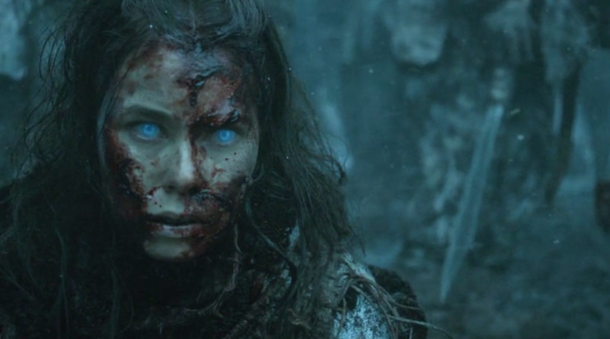
Wights. And I don’t mean Coldhands, (but we’ll get to him). I mean the wights being raised by the cold magic of the Others. If those raised by fire have their memories consumed, then those raised by ice may have their memories preserved. Even though they are dead, and even though they seemingly don’t breath (like Coldhands). Wights seemingly have no free will, and perhaps no life. Yet somehow, they seem to have memory. And yes, there is evidence.
“You’d best pray it’s a wildling blade that kills me, though. The ones the Others kill don’t stay dead … and they remember.” – Alliser Thorne (Jon VI, ADWD)
In a very suspicious sequence of events, the corpse of Othor (who was on the ranging party with the missing Benjen Stark) is found by Ghost in the Weirwood Grove when Jon takes his vows. Othor and his comrade Jafer Flowers’ dead bodies are then brought south of the Wall to Castle Black. Given that Jafer was struck by Othor’s axe, it seems at least one of them might have already been raised as wights prior to being found dormant again, implying a more calculated plot. Later that night Jon, (who is confined to quarters and being guarded) mysteriously blacks out while staring at a flickering candle and awakens to find the guard has been killed, and that the wighted Othor is making his way to assassinate Jeor Mormont. Jon is led to the wight by Ghost just in time to save the Lord Commander, and while Ghost mostly combats the wight, he is instructed to kill it with fire by Mormont’s raven.
“The flame flickered and almost died. “Burn!” the raven cawed. “Burn, burn, burn!”…
… Jon plunged his hand into the flames, grabbed a fistful of the burning drapes, and whipped them at the dead man. Let it burn, he prayed as the cloth smothered the corpse, gods, please, please, let it burn.” – Jon VII, AGOT
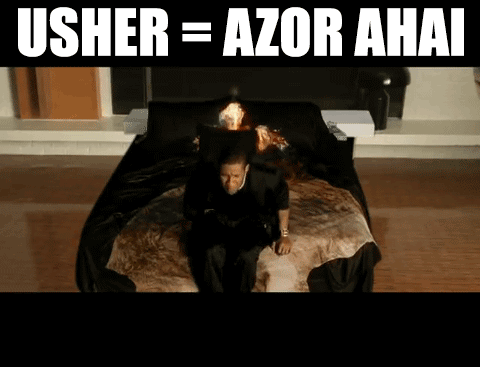
Odd huh? Not only how Jon was set up by Ghost and the Raven to save Mormont… But also how as a wight, Othor seemingly remembered exactly where the Lord Commander’s chambers were… And if we are supposed to believe that the Wall blocks the power of the Others or the reanimation of Wights (Coldhands claims he cannot cross the Wall), then why was Othor able to reanimate, presumably for a second time, on the south side of the wall?
Then in the ADWD prologue, after a failed body snatching attempt on Thistle, and a transcendental near death experience, Varamyr takes refuge in his wolf One Eye. As One Eye he regrets both what he attempted to do to Thistle, but also he regrets not succeeding. Yet when he encounters her, it’s implied that Varamyr gets the vague indication that the newly wighted Thistle actually recognizes him. Of course, this could just be paranoia and guilt on his part, but when we combine this with the words of Maester Aemon, and Othor’s knowing his way around Castle Black and specifically seeking out Lord Commander Mormont (this also calls into question the notion that the Wall blocks the power of the Others, as Othor reanimates as a wight on the southern side of the Wall), we have to seriously consider that wights are not simply empty shells being animated by the necromancy of the Others. That perhaps there is something actually present in those shells. Something preserved which is also being animated. Something which remembers.
“And in the pits where her eyes had been, a pale blue light was flickering, lending her coarse features an eerie beauty they had never known in life.
She sees me“
– Prologue, ADWD
If the identity and memory of wights are being preserved and animated seemingly without free will by the Others, and those resurrected by fire are having their identity and memory consumed by a singular purpose, then we have a pretty compelling duality. And it gives startling new meaning to a prevalent saying. As I’ve previously agreed that the saying “The North Remembers” actually refers to the ability for memory and consciousness to be preserved in the Weirwood trees, which though at one point were scattered all over Westeros, now mainly exist in the North and beyond the Wall. But could it have a second meaning? Could the Other denizens of the true North, also remember?
It would appear so.
Which really tells us that the wolf is not the refrigerator doesn’t it? so…
In review:
- How does GRRM prefer to utilize death and resurrection in his narrative?
– Martin prefers death to transform characters, bringing them back a little less than they were, deteriorating spirit and focusing purpose. - Why did Martin choose to kill Jon Snow?
– For now I’ll just say it was to transform him in a way that only death could. But I think the deeper and more specific answer to this question is something that I need to take a little further before really answering. - Who is the Beric Dondarrion that Arya meets in A Storm of Swords?
– An animated corpse who genuinely believes he is Beric Dondarrion. - How much of yourself (personality, memories, habits) can be lost before you are someone else?
– That’s subjective and depends on how you define identity. If you’ll excuse my philosophy, I see it as a tension of “being” vs “becoming” - What is the difference between a Wolf and a Refrigerator?
– You put meat in the refrigerator to preserve it. Wolves eat meat. Men are meat.
And if Martin didn’t put Jon in the refrigerator, in part II we need go back and take a deeper look at the dead. Who are they really? What is the power that brings the dead to life? and why do they come back? and who is the Lord of Corpses?
Usher is definitely Azor Ahai

Horray!
LikeLiked by 1 person
GRRM seems to have taken to heart that “All the world’s a stage, And all the men and women players.” Borrowing more from eastern philosophy and religion, the idea of transmigration of souls or the more general reincarnation is implicit in his work. Each book of asoiaf is set up like acts of a play, where a character plays one part and takes up another at the end. (This becomes more apparent in Feast and Dance, where almost all the characters suffer some type of real or symbolic death, or return from one. )
For example, there’s Jon. He’s starts as the bastard boy playing at war in Game, then truly takes up the part of a man of the Night’s Watch at the end. In Clash, he plays this part to completion, and at the end takes up the new part of turncloak. He’s plays this to completion as well, turning on the wildlings at the end to take up the part of Lord Commander.
Looking at Varamyr’s death and Pate’s “resurrection” for the two ways in which death and resurrection turn out, one can see that it’s the spirit that’s the mummer looking to take up a part, and a body is simply the spirit’s way to gain agency in the world. In terms of Varamyr’s death, the only way he can play another part, after failing to take thistle, is to become even less than an extra in the show. In Pate’s case, it’s symbolic of death reaching its hand into the world to move about an empty player on strings (the only thing truly left in these shells is a whisper, a mere suggestion for how to play the part as implied by Arya’s first face change). So we have the spirit, able to take up any part, and the bodies able to be strung up and used by anyone.
As for what part Jon will play next, I think it’s clear that he’ll spend some time in Ghost, else we wouldn’t have heard so much of the dangers of losing oneself in a wolf–which implies his body is actually dead. As for what that means for his agency in the world, like Varamyr failed plan, if he wants to become something other than a wolf he has to find a way to take up another part.
LikeLiked by 1 person
Oooh, this is so thematically close to what I will be discussing in part 2 and 3 it’s great! What part people play is definitely a MAJOR theme in the work. That said, I think I’m going to take this a slightly different direction that you might be expecting, but I do hope you’ll stay tuned.
LikeLike
Yezen…What kind of impact will the show’s characterization of Jon in the upcoming season have on the the third installment of this series of essays? This break between part two and three obviously comes at an interesting time. Since you use episodes to inform the narrative of this essay (granted, episodes written by GRRM) I feel you may be taking the show into account.
So, you know, if Jon emerges from his death slumber closer to The White Wizard as opposed to Mr. Hyde will it inform the remainder of this essay series?
I’m just curious as to how you will be including the show info that has not yet been revealed.
By the way, I’m the guy from Reddit that tried to defend you against the serial downvoted last week (and, regrettably, said they were making a dick move…even though it was:))
LikeLiked by 1 person
Hi there!
That is a good question actually, but ultimately if I’m right I’m right and if I’m wrong I’m wrong. It’s only a 3 part series, and part 2 is actually already written, and Part 3 is in progress. At this point I’m really just deciding the best times to release the remaining parts. I would have liked to get it all out before the premiere of season 6, but I don’t think that wll be possible. That said, I expect to have it all out before the second episode.
LikeLike
I recently found your blog while doing some background research on Bloodraven, and I have to say I love your thought process. I often find myself agreeing out loud with you- particularly when it comes to the idea that most of the fandom keeps falling back into well worn fantasy tropes and expectations, despite repeated warnings that this isn’t what we’re going to see. These “optimism glasses” aren’t much different from the reason fans keep refusing to see the reality of the Others. We’re so conditioned to reading a certain kind of story that we keep defaulting back into it.
Right after reading ADWD I assumed Jon was dead-as-a-doornail dead. I was shocked at how quickly reality was dismissed by fans, as if it couldn’t possibly be true. I imagine if GRRM ended ASOS right after the Red Wedding, there would have been a million fan theories about how Robb and Cat could have survived, too. And I’ve felt like I was taking crazy pills for believing that, IF Jon comes back, he’s not going to be better off for having died.
Anyways, I love your essays- keep up the great work!
LikeLike